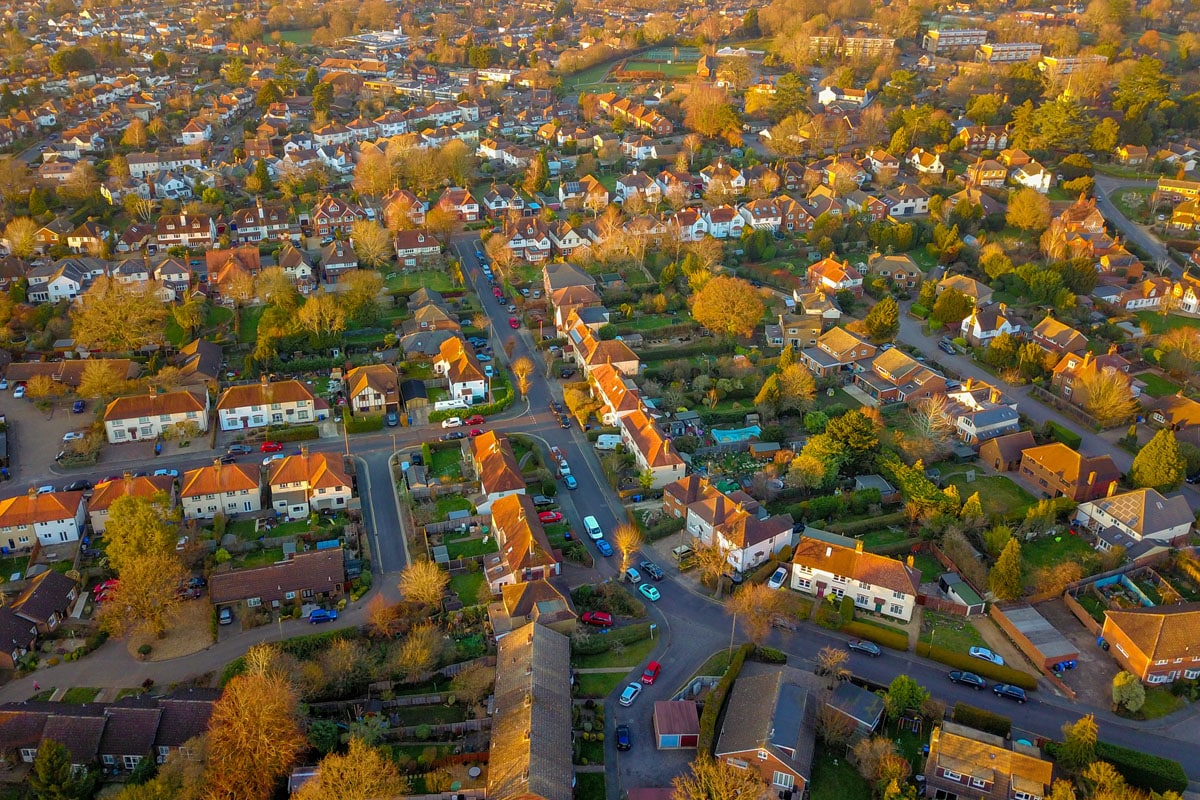Prices Will Continue to Rise: Why Investing in Property Still Makes Sense

-
by Robert Jones, Founder of Property Investments UK
With two decades in UK property, Rob has been investing in buy-to-let since 2005, and uses property data to develop tools for property market analysis.
Investing in property has made perfect sense in recent years. It has been relatively easy to invest in property, and the value of your property investment has increased year after year, after year.
Just recently, however, property investment hasn’t looked like such an easy option. A number of factors have emerged which have made some people question whether property investment still makes sense.
In this article, we will examine some reasons why, even in the current climate, property investment is still an attractive option.
Contents
- The property market is cyclical... downs are usually followed by ups
- The supply and demand fundamentals in the property market are very strong
- Property tends to be a very good hedge against inflation
- There are many reasons why property investment still makes sense
- Property can produce a regular income
- Property finance is readily available, and cheap
- There are still tax advantages to investing in property
- Property is a ‘hands-off’ investment
- Property is a real, tangible investment
- The property market has an established and proven track record
- Average house price over decades
The property market is cyclical... downs are usually followed by ups
History has shown that the UK's residential property market, and indeed in most countries, is cyclical. An upswing in property prices is usually followed by a downturn in prices and then the cycle repeats after a number of years.
According to the UK House Price Index property prices fell sharply in 1973-74, 1980-81, 1989-90, 2002-04 and 2008-10. Property prices have been on a strong upswing since 2019.
Times when property prices are falling are generally better times to consider investing in property than when they are rising – ideally when they have reached the bottom of the cycle of course. In these periods prices are lower, there is less competition amongst buyers, and more opportunities to get good value. Investors need to be able to think long-term and hold on until prices rise again of course.

Access our selection of exclusive, high-yielding, off-market property deals and a personal consultant to guide you through your options.
Short-term forecasts suggest house prices will fall
For property investors who are looking to buy towards the bottom of a property market cycle several forecasts suggest house prices could fall this year and next:
- Knight Frank forecasts that UK house prices, overall, will fall 5% in 2023 and 5% in 2024.
- Savills forecasts that UK house prices, overall, will fall 10% in 2023 and rise by only 1% in 2024.
- The Office for Budget Responsibility (OBR) forecasts annual prices will fall between 7.2% and 8% in 4Q 2023-1Q 2024.
Long-term forecasts suggest house prices will rise
Although short-term forecasts suggest a decline in property prices many longer-term forecasts suggest prices will continue to grow:
- Knight Frank forecasts UK house prices, overall, will rise 4% in 2025, 4% in 2026 and 5% in 2027.
- Savills forecasts that UK house prices, overall, will rise 3.5% in 2025, 7% in 2026 and 5.5% in 2027.
- The Office for Budget Responsibility (OBR) forecasts annual prices will rise very slightly in 2025 and then rise between 3.2% and 3.6% in 2026.
However, it’s important to remember that house price forecasts are just forecasts. They are not guaranteed and they are subject to change.
Projected percentage changes over the next 5 years
The supply and demand fundamentals in the property market are very strong
The price of any commodity depends to a great extent both on the supply of it and the demand for it. This applies in the property market as much as anything else.
When looking at the UK property market the supply and demand fundamentals are very strong.
The demand for property to buy and rent is high. The UK population has grown by 3.7 million over the last ten years. It is estimated to grow by another 2.2 million in the next ten years. (Source: ONS)
The UK has been estimated to need around 300,000 new homes every year. However, the new supply was only around 192,000 new properties in 2022. The uncertain economy and rising interest rates mean most new housebuilders will build far fewer new houses this year than last.
Supply and demand fundamentals in the UK market alone support the argument that property prices will continue to rise in the future.
As Mark Twain is credited with saying: “Buy land, they’re not making it anymore.”

Property tends to be a very good hedge against inflation
Time has tended to show that property is a very good hedge against inflation. It can be a very good way of maintaining or increasing the value of your money against inflation. Over time the value of a property has generally increased ahead of inflation. Even when it does not, property investment can moderate the impact of inflation.
- Example 1: In the period between 2000 and 2020 the UK annual inflation rate was circa 2.75%. The average UK property increased in value by 274% over this period.
- Example 2: Currently the UK inflation rate (CPI inflation) is circa 10%. Currently, property price inflation (UK HPI) is circa 5.5%.
By comparison, money held in cash is almost always a very poor hedge against inflation. For example, the best interest rate available on an easy-access savings account is currently 3.7% compared to an inflation rate of circa 10%.
(Figures from Bank of England, UK HPI and Money Saving Expert.)
There are many reasons why property investment still makes sense
Capital appreciation – the rise in the value of your investment property – is one very important reason why property investment makes sense. But it is not the only one. There are other reasons why property investment can make sense, even where property values do not rise.
Property can produce a regular income
As well as hoped-for capital appreciation property can also generate an income when it is let out.
As well as rent, a property can also produce other forms of income including those from management charges, maintenance charges, service fees and ground rents.
Property income can be taken as a regular income, or it can be used to pay down a mortgage which has been used to buy the property... or both.
Income from property is also, generally, a good hedge against inflation. Rental income rises (or should rise) when prices generally rise due to inflation.
Property finance is readily available, and cheap
It is still relatively easy to borrow money to invest in property. In fact, it is much easier to borrow money to invest in property than pretty much anything else. Most financial institutions have an appetite for this type of lending. There is a lot of competition among them to lend against real estate, which creates healthy competition in the market.
Even though interest rates have risen recently it is still relatively cheap to borrow money for property investment. Some commentators believe that interest rates are likely to peak this year and the cost of borrowing could then begin to come down again.
There are still tax advantages to investing in property
It is true to say that the tax treatment of property investment has been tightened up in recent years. For example, Section 24 has restricted tax relief on mortgage interest. More lately, reduced CGT allowances will increase tax liabilities on future disposals.
However, there are still circumstances where the tax regime actually makes it attractive to invest in property. For example, recent changes to private pension rules may benefit those who invest in commercial property, such as through a SIPP or SSAS.
Overall property investment can still make sense from a tax point of view. However, it is essential to plan for tax more carefully and, especially, to take expert professional advice on investing in property in the most tax-efficient way. This might include, for example, investing in property through a limited company.
Property is a ‘hands-off’ investment
You can invest in property without having to do any hands-on work yourself – unless you want to. You don’t need to learn any special skills. You can buy it and leave it to generate an income and, hopefully, to appreciate in value as time passes.
In property, there are plenty of professionals, such as estate agents, letting agents, managing agents, surveyors and financial advisers who can advise you and look after your property investment for you.
Property is a real, tangible investment
Property is a real, tangible investment that actually exists on the ground. Not for nothing is it called real estate. It is something you can see, use and possess. Property, at least in the form of land, cannot be destroyed. It is secure – it cannot be lost and it is very difficult to steal.
In this way, property investment makes sense compared to other kinds of investments. It offers advantages over, for example, bank deposits, paper instruments like shares, or cryptocurrency.
The property market has an established and proven track record
- In 1970 the average UK house was worth just £3,920.
- In 1980 the average UK house was worth £19,273. Over 10 years the average UK house had increased in value by £15,353.
- In 1990 the average UK house was worth £58,250. Over 20 years the average UK house had increased in value by £54,330.
- In 2000 the average UK house was worth £84,620. Over 30 years the average UK house had increased in value by £80,700.
- In 2010 the average UK house was worth £167,469. Over 40 years the average UK house had increased in value by £163,549.
- In 2020 the average UK house was worth £231,940. Over 50 years the average UK house had increased in value by £228,020.
Average house price over decades
(Average house prices are according to the HM Land Registry UK House Price Index and refer to prices of all property types combined in January of that year.)
You can perhaps see a trend emerging: Over the last 50 years UK residential property prices have only gone in one direction – up. Not only that, there have been significant property price rises over each and every decade.
It’s possible that this won’t continue into the future of course. Property price rises could decline over the next 50 years. But it seems very unlikely. This is perhaps the most compelling reason that property still makes sense as an investment over the long term.
